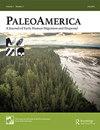恰帕斯州Santa Marta洞穴更新世-全新世过渡动物群的地震学分析
IF 1.7
Q1 ANTHROPOLOGY
引用次数: 3
摘要
摘要对Santa Marta洞穴早期人类活动相关动物群的地震学分析表明,在洞穴沉积物的形成过程中,人类活动的发生率很高,尽管其他堆积物也参与了形成过程。我们的研究结果支持了生存策略,包括开发中小型哺乳动物和水生物种,如淡水蜗牛(Pachychilus sp.)、沼泽龟(Kinosternon sp.)和螃蟹,这表明潮湿的条件有利于在岩石避难所附近形成水体。有记录表明,在狩猎采集群体的日常活动中,骨骼工业补充了石器的使用。作为埋藏学分析的一部分,我们探索了在致密骨上使用非侵入性手持X射线荧光(XRF),包括从该遗址地层序列中发现的脊椎动物遗骸,以及其他近期动物和智人的遗骸。本文章由计算机程序翻译,如有差异,请以英文原文为准。
Taphonomic Analysis of the Pleistocene–Holocene Transition Faunal Assemblage from Santa Marta Cave, Chiapas
ABSTRACT The taphonomic analysis of fauna associated with early human occupations of Santa Marta Cave shows a high incidence of anthropogenic activity in the formation of the cave deposits, although other accumulators contributed to the formation processes. Our findings support subsistence strategies consisting of the exploitation of small- and medium-sized mammals, and aquatic species such as freshwater snails (Pachychilus sp.), swamp turtles (Kinosternon sp.), and crabs, indicating humid conditions favorable for the formation of bodies of water close to the rock shelter. The presence of a bone artifact was recorded, pointing to a bone industry supplementing the use of stone tools in the everyday activities of hunter-gatherer groups. As part of the taphonomic analysis, we explored the use of non-invasive hand-held X-ray fluorescence (XRF) on compact bone, including remains of vertebrates recovered from the stratigraphic sequence of the site, as well as of other recent animals and Homo sapiens.
求助全文
通过发布文献求助,成功后即可免费获取论文全文。
去求助
来源期刊

PaleoAmerica
Earth and Planetary Sciences-Paleontology
CiteScore
3.70
自引率
0.00%
发文量
15
期刊介绍:
PaleoAmerica disseminates new research results and ideas about early human dispersal and migrations, with a particular focus on the Americas. It fosters an interdisciplinary dialog between archaeologists, geneticists and other scientists investigating the dispersal of modern humans during the late Pleistocene. The journal has three goals: First and foremost, the journal is a vehicle for the presentation of new research results. Second, it includes editorials on special topics written by leaders in the field. Third, the journal solicits essays covering current debates in the field, the state of research in relevant disciplines, and summaries of new research findings in a particular region, for example Beringia, the Eastern Seaboard or the Southern Cone of South America. Although the journal’s focus is the peopling of the Americas, editorials and research essays also highlight the investigation of early human colonization of empty lands in other areas of the world. As techniques are developing so rapidly, work in other regions can be very relevant to the Americas, so the journal will publish research relating to other regions which has relevance to research on the Americas.
 求助内容:
求助内容: 应助结果提醒方式:
应助结果提醒方式:


